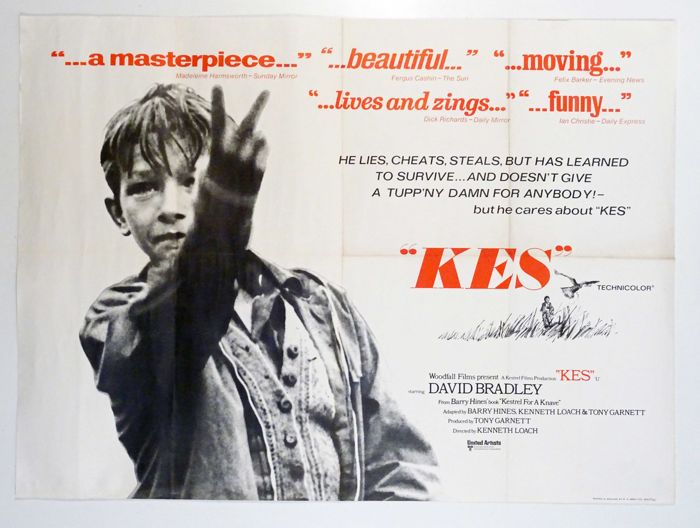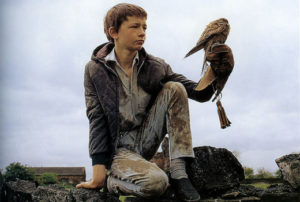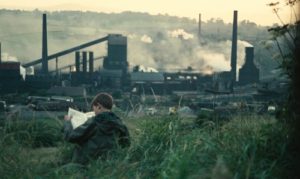
Kes (1969)
Director: Ken Loach
It’s fierce, an’ it’s wild, an’ it’s not bothered about anybody, not even about me right. And that’s why it’s great.
Ken Loach was born in the city of Nuneaton, England. He has earned a special place among the most interesting and thought-provoking directors of the British film scene. When the audience faces a Loach movie, they will find a realistic cinema with socialist themes. His filmography focuses on characters from humble neighborhoods of the UK, which are constantly hit by crime, drug addiction and unemployment. Among his prolific catalogue, we can find interesting films such as Poor Cow (1967), Riff-Raff (1991), Land and Freedom (1995), The Wind That Shakes the Barley (2006), and I, Daniel Blake (2016).
Kes (1969) is based on Barry Hines’ novel A Kestrel for a Knave (1968), and Loach created one of the most treasured and special British films: a humble, discreet gem of epic proportions for the minds and souls of the audience. More than 50 years after its release, the film continues to resonate strongly and touch the most sensitive fibers of all those who have had the pleasure of watching it. Very few films manage to combine realism, literature and political ideologies as effectively as this film does.
At the time Kes was shot, British cinema was rebelling against unrealistic Hollywood melodramas and blockbusters. Through the cinematographic movement known as Free Cinema, Loach and other directors like Lindsay Anderson, Karel Reisz and Tony Richardson dared to portray the social realism of the British working class like no one else had ever done before. Loach considered that it was necessary to use native interpreters, who came from these same social conditions in order to reflect the disadvantageous conditions of the British working class. That’s why he casted unexperienced and unknown actors which spoke local dialects and knew the dilemmas and socio-economic limitations of that particular time.
Kes focuses on Billy Casper (David Bradley), a boy who must face extremely bleak living conditions. He lives in a poor house located in Barnsley, a mining town in South Yorkshire. His half brother, Jud (Freddie Fletcher) is an alcoholic and violent man, who constantly abuses him physically and mentally. His mother, Mrs. Casper (Lynne Perrie) has many chaning partners and lacks maternal instincts. Billy’s father has abandoned them. Billy isn’t good at school and he hasn’t any friends, he is resigned to work in the terrible conditions that the mining industry offers him. These conditions make Billy a rebellious, disobedient and frustrated child. He steals and forms part of a gang. Although he is trying to get away from those bad companies, he is constantly being dragged towards them. One day, Billy discovers a nest of Kestrels (a species of falcon), he decides to take one and tries to train it – Billy calls the bird “Kes”.
What begins as a simple curiosity to appreciate and take care of the animal, soon becomes the only light and motivation of the child. After stealing a  bird training book, the boy spends his afternoons after school with Kes, teaching him how to fly. The scenes that capture Billy training the bird, allow us to see the rural landscapes of Yorkshire, which serve to portray the freedom that the child longs for, and the inner feeling of being isolated from people. The responsibility of taking care of Kes produces a change in the boy. Soon, the animal begins to raise the child’s self-esteem, awakening an insatiable passion and an enormous desire for living.
bird training book, the boy spends his afternoons after school with Kes, teaching him how to fly. The scenes that capture Billy training the bird, allow us to see the rural landscapes of Yorkshire, which serve to portray the freedom that the child longs for, and the inner feeling of being isolated from people. The responsibility of taking care of Kes produces a change in the boy. Soon, the animal begins to raise the child’s self-esteem, awakening an insatiable passion and an enormous desire for living.
Billy’s special relationship with Kes is not the same conventional romanticization that you’ll find in a Disney movie, in which the animal “saves his life” and makes him regain his freedom. No, this is not a magical fable: here, we see the bleakness of the family and the hostile teachers of the child, who don’t consider that Billy’s passion is an element that must be cultivated and supported. No one around him imagines that is possible to escape the aura of mediocrity and poverty that is “already written” for the boy. Among many phenomenal moments in the film, a brilliant moving scene stands out and shouts out loudly the distressing situation that Billy experiences every day: He has a fight with a schoolmate who has insulted his family, and a young teacher, Mr. Farthing (Colin Welland), separates them. Then, they are both alone in the schoolyard. Farthing asks Billy why he gets into so much trouble and why he is so undisciplined. Billy relieves himself and unpacks his afflictions in front of the only teacher who seems to pay attention to him, taking interest for his life. Billy releases a monologue that is worthy of applauses.
On the other hand, the film has very fun and revitalizing moments- there is a fantasy soccer cup match between the Spurs and Manchester United, in which the children participate. This match is orchestrated by Mr. Sugden (Brian Glover). The scene features nostalgic moments that any child who has been on a public school will be familiar with; crappy and dingy pitches, dirty changing rooms, and kids dreaming of being football superstars.
The film was also shot during a period of industrial unrest when the coal mining industry was being degraded in the face of increasing competition from the oil and gas industry. Loach used a total of 16 different locations to shoot the film. Many of these places no longer exist, since the urban landscape has been completely transformed after the collapse of the coal mining industry. But local people can still identify the specific locations, although many of the original buildings and streets have been renovated and are difficult to identify.
mining industry was being degraded in the face of increasing competition from the oil and gas industry. Loach used a total of 16 different locations to shoot the film. Many of these places no longer exist, since the urban landscape has been completely transformed after the collapse of the coal mining industry. But local people can still identify the specific locations, although many of the original buildings and streets have been renovated and are difficult to identify.
While some people have a privileged social position and more facilities to access certain jobs in higher orbits, the world of Billy Casper is a very difficult, cold, dark and depressing place – getting out is a real challenge. Kes is a monumental sequence of beautiful, blissful and mind-blowing artistic peaks that will leave our feelings and emotions exposed: love, passion, misery, courage, laughs, and ultimately: hope.
by Octavio Carbajal González

Beautifully written Now I’ve got to watch this.
Now I’ve got to watch this.
Thank you so much for the comment, Moira!. .
.
I’m extremely grateful with all these amazing responses. Enjoy the movie
Incredible that such a “British” film should have found such a receptive audience outside of the U.K. Your thoughtful analysis of the film is really heartwarming fifty years after its release. The fact that you embrace Kes and I Daniel Blake is proof that Ken Loach’s talent is universal. It was a real pleasure to work on the film with some amazing musicians, especially jazz flautist Harold McNair who musically represents Kes in the film.
Incredible that such a “British” film should have found such a receptive audience outside of the U.K. Your thoughtful analysis of the film is really heartwarming fifty years after its release. The fact that you embrace Kes and I Daniel Blake is proof that Ken Loach’s talent is universal. It was a real pleasure to work on the film with some amazing musicians, especially jazz flautist Harold McNair who musically represents Kes in the film.
Wow, thank you so much!!.
The dreams, innocence and tragedy are on perfect synchronicity with the music. The flutes, clarinets and harps are absolutely beautiful – extraordinary soundtrack.
Loach’s talent is timeless and universal. “Kes” is an unmissable movie for lovers of harsh realism.
Beautiful review, Octavio. And a special film whose subject matter is unfortunately overlooked. It is rare to love something or someone for their purest nature. To admire and want to near in the most natural way.
“Billy’s special relationship with Kes is not the same conventional romanticization that you’ll find in a Disney movie, in which the animal “saves his life”
You really captured the truth at the film’s purity and truth. Thank you
I saw what she wrote. Congratulations. You deserve praise. Hope you are safe during these strange times.
Octavio,
I’ve had the opposite experience of Jorge. I didn’t connect much with Ken Loach’s earlier films (Black Jack, Kes, etc.) but I was deeply moved by I, Daniel Blake–completely captures the economic crisis of our time, heartbreaking, most deservedly won the Palme d’Or. I watched Kes recently on the Criterion Channel. After reading your wonderfully written review, I should revisit Kes.
Agree with “I, Daniel Blake”, a well deserved “Palme d´Or”. Such an incredible lefty punch against bureaucracy and neoliberal systems. You should revisit “Kes” (Krzysztof Kieślowski said that it was one of his favorite films). Thank you for reading and appreciating my review, Mark !.
I didn’t like “Daniel Blake”, but it seems like I must watch this. Thanks for the recommendation!
I loved “I, Daniel Blake”, and most of Loach´s films. But, “Kes” is something else, it carves unique feelings inside me, I can say that it simply stands on it´s own. You´re welcome !
Heartbreaking end, there simply cannot be any hope in this terrifying social order. Brilliant film.
The monumental realism in this movie is crucial to comprehend social dimensions, the ending feels like a harsh life lesson. Agree, brilliant film.
This film is at the top of my list of the best films. Ken Loach created a timeless masterpiece that unfortunately receives too little attention. Based on the individual fate of a child from the English working class, Loach shows the complete desolation and harshness of Western societies. But without a moral index finger or inappropriate sentimentality. Never have I seen a film that touched me more.
You described it perfectly: “a timeless masterpiece that unfortunately receives too little attention”.
Undoubtedly, the anti-romanticization of the animal is crucial for the story. Billy has been psychologically damaged, and he doesn´t rejoices in this abysmal sadness, he learns that passion and love can be found inside the most unexpected places. He has an extreme awareness that nothing lasts forever. This is one of the most brilliant, realistic and painful isolation portrayals that I´ve seen on screen, David Bradley earned my respect with this performance. For me, not even Truffaut´s “The 400 Blows” or Lynne Ramsay´s “Ratcatcher” get close to this masterpiece.
This is the best review that I’ve read by you, flawless and beautiful. It’s your language and thoughts, and how perfectly you capture the film and its sentiment & mood. And it is also the film itself, which is a most special one for me and one of the most memorable films I’ve ever seen. I remember watching it as a teenager in my ‘British Realism’ phase- those films from directors like Ken Loach, Lindsay Anderson and Mike Leigh resonated very strongly with me and I barely watched anything else until I had seen them all. They were real and authentic in a way that it hurt- and it has to hurt. And they spoke to the soul and heart but, completely lacked the Disney-style sentimentality as you rightly point it out. Those added their voices to the public outrage, and it’s not just that they don’t make films like that anymore, but also that the public outrage is gone- which is an ongoing, symbiotic cause-and-effect interplay.
My favorite Ken Loach quote, about Thatcher’s death: “Let’s privatise her funeral. Put it out on competetive tender and accept the cheapest bid. That’s what she would have wanted.”
Kes is a very special film, thank you so much for covering it, and so beautifully.
It’s always a pleasure to contribute and give people an epic outlet for their minds. Again, Vinyl Writers presents an underrated masterpiece to the world.
I’ve always said it: the movies that dare to push the boundaries are the ones that change lives. These kind of films have the power to revolutionize people’s perspectives about themselves, their surroundings and the world.
The realism portrayed in “Kes” is absolutely bone-chilling. This movie laughs in the face of bombastic productions and Disney’s over the top “touching stories”. This was done on a low budget, shot on specific locations and with real people. As you said, the “British realism” scene is full of goldmines, that “public outrage” is almost unexistent nowadays.
Great quote!, Loach absolutely smashed Thatcher’s figure (and for good reasons). “Mass Unemployment, factory closures, communities destroyed – this is her legacy. She was a fighter and her enemy was the British working class,” – Loach said.